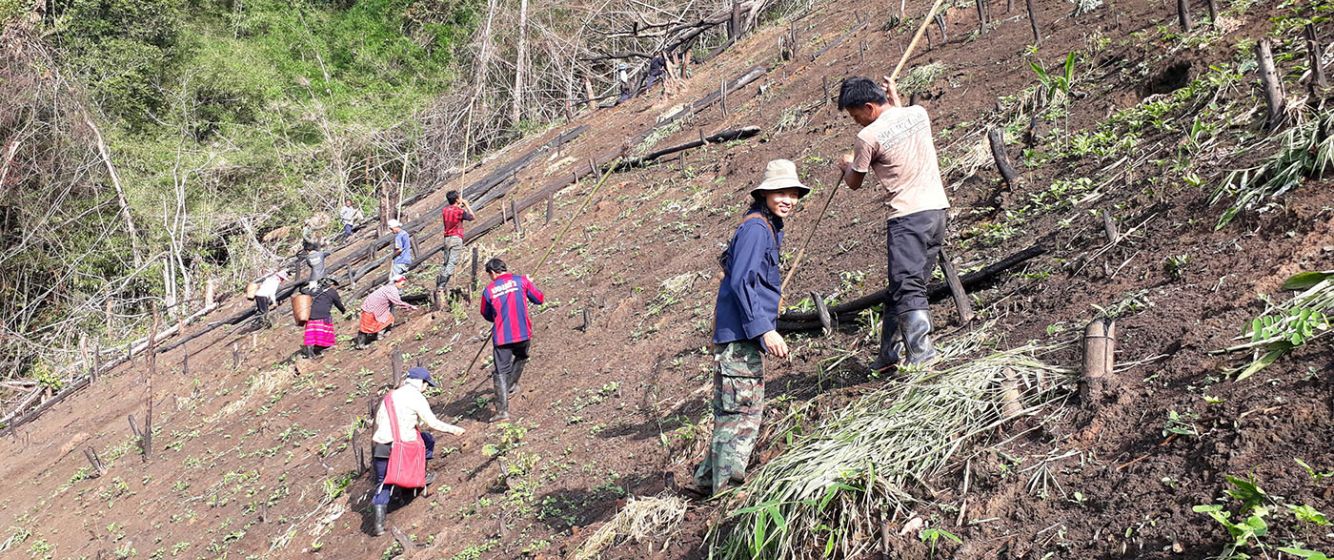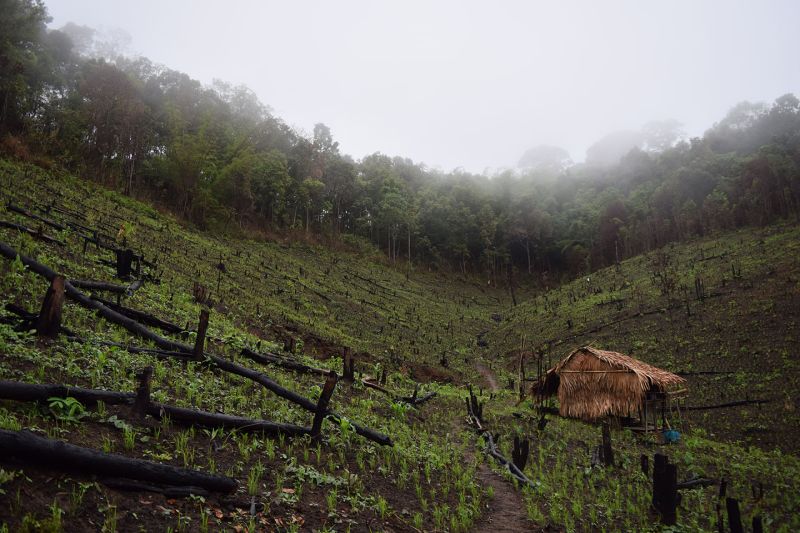
Villagers working on the land after the rice ceremony.
Orraya's Diary from Her Stay at Huay Hin Lad Nai Village—Part Two
The team from Chiang Mai University led by Malee Sitthikriengkrai and Siya Uthai are investigating the livelihood practices of the Karen ethnic group in Huay Hin Lad Nai village of Chiang Rai province in Northern Thailand.
One of their research assistants, Orraya, went to stay at the village and live with the community members to learn about their lives, and documented her stay in the form of a diary. The first part of Orraya's diary can be found here.
June 6, 2017 4.57 a.m.
Today, I woke up early to cook rice, and as I was finishing I heard the sound of a car engine, which was a mobile shop selling vegetables, eggs, desserts, and other eatables. The car stopped at the village center, near a village meeting room. I walked with Ms. Manao to buy ‘Khao Mao’, a dessert made from rice mixed with coconut, coconut milk, and sesame. After that, I went back to wash my clothes and then tried to mash coffee beans. Mr. Tod taught me how to make a coffee from the coffee beans. He showed me how to make mild roasted coffee by rinsing the bowl with water first, then putting 200 grams of mashed coffee and slowly pouring hot water through it. The taste of the fresh roasted coffee was acerbic and sour. After finishing a cup of coffee, I had breakfast.
At that time, Ms. Jittra, a daughter of the community leader Chaiprasert, called me to the field of Father Nu Papa. Father Nu’s field is in the same direction that I went on the first day but farther away. I had to walk past a narrow walkway that was more like a waterway with the wet weather at the time.
When I arrived at the field, they were in the middle of cultivation rituals. Lek and another boy were at the ceremony. The village senior told me that a virgin girl and boy (not married) must lead the ceremony by dropping rice in the hole in front of the cottage. The boy walked first and dropped rice and other seeds into 5–9 holes. After that the boy dug holes around the cottage into which the girl dropped rice and other seeds before ending the ceremony.
After the ceremony, everyone prepared for luncheon with a pre-ritual by putting little portion of rice and side dish on the banana leaf to let the land guardian eat first. The oldest man in each family took this responsibility.
After lunch, Father Nu Papa asked me the English names for some herbs and I also asked him in Karen words before chatting with other workers. I saw Mr. Supawong had brought Hor Wor (local herb) on the top of a shovel during hole-digging. Hence, the Hor Wor seeds would fall down into the soil without dropping them. During the walk back with Jittra, she told me about the herbs and plants along the way, for example, the Laurel clock vine that can relieve toxic symptoms.
While I rested at Jittra’s place, the community leader Chaiprasert came to talk with me. He told me about the award ‘Hero Forest’ that was given to him, but he didn’t participate in that ceremony because the award was given to individuals and didn’t honor our work as a community—as an individual he could not protect the forest alone. In Chaiprasert’s view, it is about livelihoods with local beliefs.
“For us, we live in the forest, thus all farming and planting are integrated within the forest. There are no farmland for single plants such as tea fields. Our livelihoods are eco-friendly to ensure both forest and human survival. We live with the forest, not only gathering forest products to consume, but also protecting and maintaining its fertilities. The forest is the source of income, food, livelihoods. If you really live with the forest, you will learn to value it, but some people just stay in the forest without realizing its importance,” he said.
Chaiprasert talked to me about the forest legislations as well. Forest laws divide human and forest and made people hate the forest when they did something that broke the laws. Generating forest legislation cut off people from part of the forest, but animals are allowed. Therefore, humans have less rights to live in the forest than animals. Animals survive because of the forest the but the forest needs to be maintained by people, thus the law should allow people to live in the forest as well. In 1986, the area has been enforced to be forest concession for the purpose of increasing national income. After that, animals, herbs, and big trees are gone. The agency that got the concession came with numerous workers to cut the trees. This created natural disasters; flooding and fires in 1988–89.

Farmland awaiting the rainy season
Two years after, the brook had no water, 30 elephants are gone. When villagers contacted concession’s owner, they said that they did it legally and the state got 30% of income. The forests that have been protected by the local community from generation to generation are gone because of forest laws. Law enforcement should include customary laws to make it sacred. Nowadays, authorizers do not understand forest and environment, they point out at humans as forest destroyers only.
After I left Jittra’s house, I found Pati Nives was in ‘Wai Pee Nam’ ceremony. After his daughter-in-law kept banana leaves in this area, she got a pain in her hand and was unable able to do anything with her hand. Hence, Pati Nives needed to perform the ‘Wai Pee Nam’ ceremony by preparing leaves that contained rice, turmeric, salt, chili, chicken feathers, acacia and eggshell and putting them around the brook brae. Next, he prayed to the water spirit to get rid of his daughter’s pain before he took all the stuff into the water.
Pati Nives also told the legend of rice and money, as they asked the owner which one is the most valuable. The owner replied that money is the most valuable so, rice ran away to hide out in the rock with no return. Once, a bird found rice at the rock and ate its seed to store in its throat. The bird brought that seed to humans and thus, people have rice to eat until today. Therefore, there is flower offering ceremony after the cultivated season to respect the bird which is called ‘Nok Kwan Kaew’.
Comments
Note on Diary
Orraya, I enjoyed reading your diary entery. It is interesting to read the value that forest holds for people who live in such close contact with it.